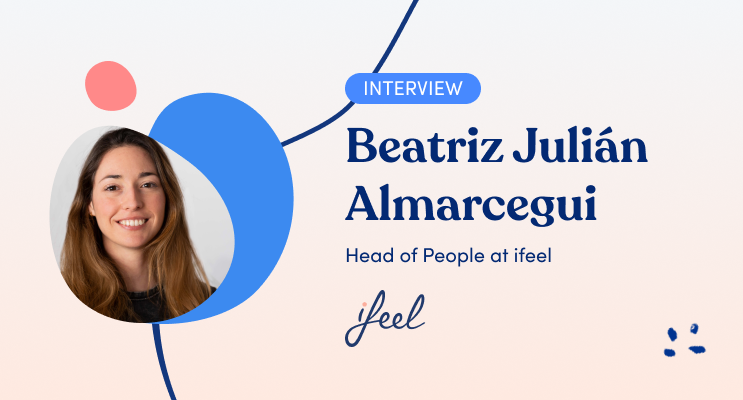Beatriz Julián Almarcegui Head of HR at ifeel
Bea studied psychology and specialized in the areas of HR and occupational risk prevention, she has worked for several international companies implementing people management and well-being strategies. Her hobbies include painting, music and meditation.
As HR Manager at ifeel: What do you expect to be the main HR trends this next year and beyond? How much importance would you give to employee well-being?
I give it great importance, I really believe that employee well-being is going to be one of the main trends. Of course, there has been a commitment for years to actions that foster employee well-being, but this time it involves mental health, which has been largely neglected.
Separating work from personal life is impossible. If it was already complicated before, now that our home is becoming our office, how do we set limits so that they don’t affect each other and vice versa? Employees are making decisions about how they want to live their personal and professional lives and they don’t want a job that doesn’t take care of their physical and mental health. This affects talent retention and productivity as well as the work environment and relationships with other colleagues. Those companies that integrate this holistic view of the employee, seeing them as a human with emotions and situations that affect all aspects of their lives, and invest in them to take care of it, will have an advantage over other companies.
Another trend for next year, I believe, will be the digitalization of day-to-day HR. I don’t think the focus will be on whether to implement remote work or return to on-site work, the talent in the market demands flexibility and for this, we must adapt HR procedures that have been done solely in person. It is now time to reshape teambuilding activities, remote onboardings, productivity assessment with a focus on objectives rather than working hours and optimize communication so that the company and the employees feel they are still in the same place without losing information along the way, whether you are at home or in the office.
“It is now time to reshape teambuilding activities, remote onboardings, productivity assessment with a focus on objectives rather than working hours and optimize communication so that the company and the employees feel they are still in the same place”
Has remote work been a challenging change for you in terms of team management? How have you dealt with it?
Of course, I think it has been for everybody. Before the pandemic, it was a debate that was on the cards but not quite implemented. We all had to adapt overnight, with a lot of questions for which there were no success stories to look at.
Instead of modifying the way things have been done, I think the key is to open our minds and understand that what worked before may not work now. Sometimes we cling on to systems that have been used for many years, but in some cases, they no longer work or are simply not the best method. The key is not to stick to what we already know but to open up a debate, listen to other points of view and create new methods if we have the opportunity to do so.

According to the latest study carried out with our partners DKV, Gympass, and Cobee, 7 out of 10 employees have stated that their health has worsened in the last year, with stress being one of the main causes. What impact do you think the pandemic’s spread and evolution have had on employee well-being?
It has been a very hard but also very introspective time. On the one hand, all this uncertainty has helped us to rethink what we want in our lives and what we don’t want. The fact that the company’s objective is in line with your values has a positive impact on stress management.
We have an amazing team, always on their feet and very talented, there is a lot of work but the company’s mission motivates us and the company’s culture inspires us to manage the stress that may arise with useful tools based on respect and flexibility.
“Moreover, for us, the pandemic has translated into more work because people who didn’t even think about it before are making room to take care of their mental health, and there is a greater demand for platforms such as ifeel. I assume that everyone’s health has suffered, but productivity has been the same or even higher“
What does it mean to you, both professionally and personally, to work in a company focused on caring for the emotional well-being of employees and organizations?
For me, it is a combination of two worlds I am passionate about, HR and psychology.
I trust the therapeutic process and the importance of having tools to manage mental health so that a person can thrive in all aspects of their life.
A few years ago it seemed unrealistic for companies to invest in it, but now it is a reality; being part of the change towards health in organizations and in people’s daily lives is very comforting to me, both personally and professionally.

To finish off, we would like to know one of the main challenges you have faced in your career as an HR Manager and a professional goal you have set for yourself for the new year
One of the biggest challenges has been and continues to be communication and transparency. In line with what we mentioned earlier, with remote teams it is difficult to democratize information and ensure it reaches everyone. It is important for communication to be fluid and appropriate, avoiding holding extra meetings that can generate stress due to lack of time; but without losing information along the way, which can generate confusion, misunderstandings, and a feeling of detachment from the company.
My goal is to take care of this communication and to continue taking care of the well-being of our employees.







